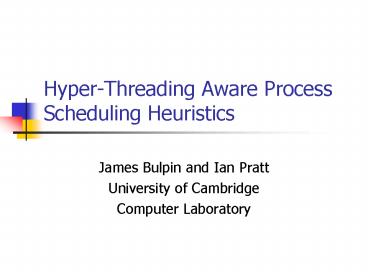HyperThreading Aware Process Scheduling Heuristics - PowerPoint PPT Presentation
1 / 10
Title:
HyperThreading Aware Process Scheduling Heuristics
Description:
Hyper-Threading Aware Process Scheduling Heuristics. James ... e.g. avoid co-scheduling two cache-thrashers. More important in multi-package/core systems ... – PowerPoint PPT presentation
Number of Views:125
Avg rating:3.0/5.0
Title: HyperThreading Aware Process Scheduling Heuristics
1
Hyper-Threading Aware Process Scheduling
Heuristics
- James Bulpin and Ian Pratt
- University of Cambridge
- Computer Laboratory
2
Introduction
- Simultaneous Multithreading (SMT)
- Fine-grain hardware multithreading
- Processor resources dynamically shared
- Extracts thread-level parallelism
- Intel Hyper-Threading (HT)
- 2 heavyweight threads
- Some static partitioning, dynamic core with some
fairness mechanisms - Shared caches
3
Effect on Scheduling
- HT abstracted as independent logical processors
- Processes can have mutual detrimental effect
- Varies with workloads, large range of combined
performance - Can improve performance by scheduling processes
that perform well together - e.g. avoid co-scheduling two cache-thrashers
- More important in multi-package/core systems
4
What is good performance?
- Optimise for performance - how to measure?
- Maximising IPC is biased towards high-IPC tasks
- Want to compare performance under HT to what we
would have had with no HT - Fair to high-IPC and low-IPC tasks
- HT performance ratio pi,b for code block s in
interval i - System performance ratio is sum of running thread
performance ratios
Time to execute s with no HT Time to execute s
with HT and code block b running on the other
thread
5
Performance Estimation
- Can only get pi,b exactly by measuring both cases
- Use online method to estimate
- Processor performance counter data
- Estimate pi,b as f (perf counter increments)
- f is linear function of increments
- Coefficients learned by measuring HT and no-HT
cases for a training set - Break tasks into multiple, short code blocks
- Time code block running no-HT and HT against
various other tasks - Multiple linear regression on results
6
Scheduling (1)
- Modify scheduling decision to try to maximise
system performance ratio - Estimate performance ratio of task pairs
- Rolling average for each pairing that occurs
- Small cache indexed by hash(pid1, pid2)
- Use this to influence scheduling
- e.g. avoid co-scheduling a pair of tasks that
performed badly together in the past - e.g. select best performing task for one logical
processor given the task running on the other
logical processor
7
Scheduling (2)
- Implementation tryhard
- Modify dynamic priority of a task depending on
the task running on the other logical processor - Implementation plan
- Gang schedule tasks based on a scheduling plan
created occasionally based on recorded
performance data - Allow other pairings to run occasionally
- Dont want to miss a potentially good pairing
- Use heuristics rather than rigid rules
- Respect static priorities, starvation avoidance,
etc.
8
Results
- Linux 2.4.29
- P4 Xeon HT 2.4GHz
- Benchmarks from SPEC CPU2000
- Speedup is akin to system performance ratio
- basic is native package, rather than logical
processor, affinity - ipc is a simple IPC-maximising scheme
- Checked for fairness and respect of static
priority
9
Summary Conclusions
- Performance on Hyper-Threading can be estimated
using performance counters - More fair than counting IPC
- Performance gains are possible with HT-aware
scheduling - Gains are relatively small and incur some
complexity - May not be worthwhile
- Further work
- Improved estimation
- Application to other schedulers, e.g. Linux 2.6
10
Related Work
- Thread-sensitive scheduling Parekh 2000
- Maximise a metric (e.g. IPC, cache hit rate) per
scheduling quantum - Symbiotic jobscheduling Snavely 2000, 2002
- Sample, optimize, symbios
- Hyper-Threading in Linux Nakajima 2002
- Longer period performance counter sampling,
modify hard CPU affinity of tasks - Chip multithreading Fedorova 2004, 2005
- L2 cache-conscious scheduling to increase hit rate































